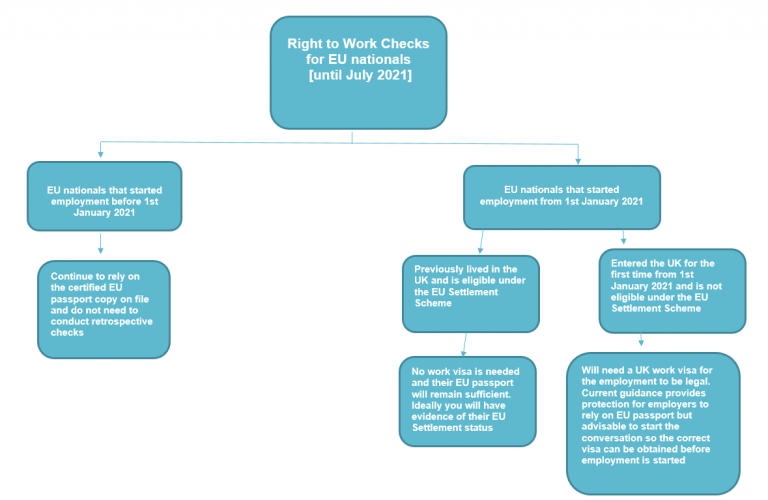Beware of the post-Brexit right to work for EU nationals
Published on 15th February 2021

As the freedom of movement ended on 1 January 2021, any EU national entering the UK for the first time after this date or those not eligible under the EU Settlement Scheme or without another immigration status will need a work visa to work in the UK.
The current guidance allows companies to use EU passports as sufficient right-to-work evidence until 30 June 2021 and companies cannot insist on EU Settlement Status documents due to discriminatory claims. We are expected to receive updated guidance from the Home Office regarding this, but, in the meantime, this is problematic, as some of the new hires that are EU nationals will require a visa before starting work in the UK.
There are immigration and employment aspects to consider each time you are going through an interview process, or even at the offer stage, and are trying to understand whether the potential employee requires a work visa and the implications in terms of cost and timing.
Interviewing stage
Any question raised regarding visa status, right to work and previous residence in the UK bears the risk of a potential discriminatory claim should the candidate be rejected. The candidate may argue that their response or the need for a UK visa influenced the company's decision to reject their application.
Some companies do discuss visa needs to assess timings for the start of the employment but must be mindful of the potential risks. It will help if there is consistency in questions asked for all candidates and there is full evidence as to why candidates are rejected.
Other ways to find information indirectly about whether an EU national needs a work visa are checking recent employment on their résumé and asking for references from their previous employer. This can give an indication as to whether they have worked in the UK recently but cannot guarantee that they have secured a status under the EU Settlement Scheme and if they are eligible.
Employment offer stage
There is more flexibility at this stage as candidates have already been offered employment and the risk of discriminatory claims are lower. The key is always to include wording in the offer letter or employment contract clearly stating that the employment is subject to the individual having the right to work in the UK. For EU nationals, there is still a need to for an approach that restricts the questions in order to limit the risk of discriminatory claims. We have a few example questions that can help the company to understand the employee's visa needs, but it is essential not to insist on any of these if the individual is not willing to answer or provide evidence:
- Have you applied under the EU Settlement Scheme and what was the outcome? It would be great if you are able to send us a copy of this.
- Do you have any pending UK visa applications that could impact your UK start date with us?
- Do you need any assistance with a UK visa application before commencing employment with us?
Right-to-work checks before employment starts
For non-EU nationals, the key is to ensure you have a certified copy of their passport and UK visa that allows them to work in the UK or alternatively you can conduct the online right-to-work check on the government site.
For EU nationals, you can simply rely on their EU passport until the end of June 2021 but, if you do manage to get any of the questions above answered and have evidence of a work visa or EU Settlement Status, do update their records. For those that do not provide evidence and their employment started from 1 January 2021, we highly recommend keeping a list of these employees so further checks can be made once the new guidance is available from the Home Office.
The company is protected against any illegal employment as long as they have a certified copy of the EU passport based on the current guidance. However, there are issues if the company knowingly does not apply for a visa for the EU national when they know the individual requires a visa and also there could be implications for the individual for not having the correct permission to work in the UK as they will be breaching the terms of their visitor status.






